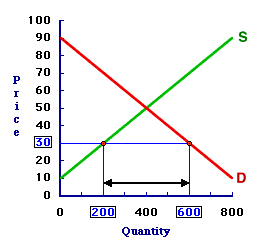
|
|
RIVAL CONSUMPTION: Consumption of a good by one person imposes a cost on, or prevents consumption of the good by, another person. Some goods, like food, have extremely rival consumption. One person, and only one person, gets the benefit. Other goods, like national defense, have no consumption rivalry, everyone can benefit simultaneously without imposing a cost on others. This is one of the two key characteristics of a good (the other is excludability) that distinguishes between common-property goods, near-public goods, private goods, and public goods.
Visit the GLOSS*arama
|
|


|

|
                           SELLERS' MARKET: A disequilibrium condition in a competitive market that has a shortage or excess demand. Because the quantity demanded is greater than the quantity supplied, sellers have the "upper hand" when negotiating. A sellers' market also goes by the more common term of shortage. The alternative to a sellers' market is a buyers' market, which has a surplus or excess supply. A sellers' market exists because the quantity demanded by the buyers exceeds the quantity supplied by the sellers... at a given market price. In this situation, buyers seek to buy more of the good than sellers are willing to sell, hence sellers can pick and choose whom they sell to among prospective the buyers. Buyers are lucky to find a good to purchase.| Sellers' Market |  |
A sellers' market is illustrated by the market for 8-track tapes displayed in this exhibit. This graph was generated with data from the 88th Annual Trackmania 8-Track Tape Collectors Convention at the Shady Valley Exposition Center.Sellers have the "upper hand" in this market due to the excess demand of 8-track tapes. This shortage is indicated as the difference between the quantity demanded and the quantity supplied at the designated market price. In particular, the 30-cent price generates a quantity demanded of 600 tapes and a quantity supplied of 200 tapes. Buyers are willing and able to buy 400 tapes more than sellers are willing and able to sell. This excess demand of 400 tapes is what gives the sellers the upper hand. Note that a sellers' market does not mean the lack of competition among suppliers have given some sellers market control. A sellers' market is a competitive market that simply has a temporary imbalance between the quantity demanded by the buyers and the quantity supplied by the sellers. A change in the market price would eliminate the sellers' market, and possibly even create a buyers' market.

Recommended Citation:SELLERS' MARKET, AmosWEB Encyclonomic WEB*pedia, http://www.AmosWEB.com, AmosWEB LLC, 2000-2025. [Accessed: July 18, 2025].
Check Out These Related Terms... | | | | | | |
Or For A Little Background... | | | | | | | | | |
And For Further Study... | | | | | | | | |
Search Again?
Back to the WEB*pedia
|



|

|
YELLOW CHIPPEROON
[What's This?]
Today, you are likely to spend a great deal of time searching the newspaper want ads trying to buy either a T-shirt commemorating the 2000 Olympics or a genuine fake plastic Tiffany lamp. Be on the lookout for telephone calls from former employers.
Your Complete Scope
This isn't me! What am I?
|

|
|
Potato chips were invented in 1853 by a irritated chef repeatedly seeking to appease the hard to please Cornelius Vanderbilt who demanded french fried potatoes that were thinner and crisper than normal.
|

|
|
"A winner is someone who recognizes his God-given talents, works his tail off to develop them into skills, and uses those skills to accomplish his goals. " -- Larry Bird, basketball player
|

|
TSP
Time Series Econometrics (software)
|

|
|
Tell us what you think about AmosWEB. Like what you see? Have suggestions for improvements? Let us know. Click the User Feedback link.
User Feedback
|


|


